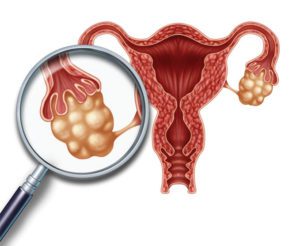By Hilary A. Sojdak, APRN, Director of Clinical Services at PASWFL
 Polycystic ovary syndrome (PCOS) is a health problem that affects 1 in 10 women of childbearing age. Women with PCOS have hormonal imbalances and metabolism problems that may affect their overall health and appearance. PCOS is also a common and treatable cause of infertility.
Polycystic ovary syndrome (PCOS) is a health problem that affects 1 in 10 women of childbearing age. Women with PCOS have hormonal imbalances and metabolism problems that may affect their overall health and appearance. PCOS is also a common and treatable cause of infertility.
https://www.womenshealth.gov/a-z-topics/polycystic-ovary-syndrome
The physical symptoms of PCOS include irregular menstrual periods, including periods that come too often, not often enough, or not at all. Signs that you have high levels of androgens (male hormone) which may be extra hair growth on your face, chin, and body (hirsutism), acne, thinning of scalp hair, higher than normal blood levels of testosterone, and multiple cysts on one or both ovaries.
Metabolic problems such as insulin resistance, and high fasting glucose blood levels create a risk for diabetes. Other physiological disorders include hypertension, thyroid imbalances, and high cholesterol, and obesity with inability to lose weight can all lead to problems with self-image which then may lead to a variety of psychiatric or psychological signs or symptoms and disorders.
Often, the first indication of PCOS presents in a psychiatrist’s office due to the multitude of psychiatric symptoms that may evolve from the disorder.
Symptoms such as fatigue, insomnia, mood irritability or agitation, lack of focus and desire can all exacerbate or cause symptoms of depression, anxiety, or even bipolar illness. Eating disorders may develop due to weight gain, and very often women present to psychiatry with complaints of the above and frustration with lack of relief from the symptoms. Women may often be started on psychotropic medications with hopes of alleviating depression, anxiety or mood swings and many times find the result is greater frustration and that the woman feels worsened symptoms of depression, and despair due to lack of efficacy and the potential side effects that psychotropic medications may cause.
Pharmacologic agents such as metformin, spironolactone, birth control pills and thyroid medications may help alleviate some of the metabolic and physical symptoms of PCOS, but what about the co-morbid psychiatric symptoms and illnesses that are commonly endured? Psychotropic medications most often seen used include antidepressants, mood stabilizers, antipsychotic medications or anxiolytics. While some of these medications may prove effective, they may only be of benefit short term, or with side effects ranging from suicidality, weight gain, loss of libido or even fatal reactions such as Steven Johnsons Syndrome.
With so many potential adverse effects of psychotropic medications new technological options should be considered such as noninvasive brain stimulation modalities or Ketamine treatment. Repetitive transcranial magnetic stimulation (TMS), or Theta Burst Stimulation (TBS) are examples of alternatives and possibly safer intervention for depressive symptoms. TMS is an appealing option given the lack of systemic effects that are typically associated with medications which can adversely impact psychiatric symptoms.
PCOS is not just a medical/physiological illness but also contributes to symptoms of psychiatric illness. Symptoms can often go unnoticed or treated ineffectively. A variety of options are available for treatment for the psychiatric symptoms with the recommendation that medical treatment be provided in conjunction.
Psychiatric Associates of Southwest Florida, PASWFL
Dr. Robert Pollack, a Board Certified Psychiatrist, has extensive experience in managing his patients that need this therapy. And he consistently sees the benefit of the Ketamine IV treatment in his patients that suffer from depression firsthand.
Ketamine Therapy coordinated by Dr. Pollack is a safe, reliable treatment tailored to each patient’s unique medical profile. They administer the therapy using state-of-the-art technology, which allows them to monitor and evaluate each patient’s response and progress meticulously.
6804 Porto Fino Cir #1, Fort Myers, FL 33912
Office: 239-332-4700 | TMS & Ketamine: 888-491-4171
About Dr. Robert Pollack
Robert W. Pollack, M.D. CEO is a Florida-licensed Board Certified Psychiatrist. He has been in practice since 1977 and has served the public in many capacities.
The American Psychiatric Association Board of Trustees, January 1, 2015, has granted him Life Fellow status.
Psychiatric Associates of Southwest Florida (PASWFL) is a private solely owned psychiatric medical practice located in Fort Myers, Florida. Dr. Pollack is currently the CEO of Psychiatric Associates of Southwest Florida and resides in Fort Myers. His practice serves people from ages 18 and up. His current special interests focus on the use of Genomics to aid in the determination of the most efficacious way to utilize psychotropic medications as well as the use of rTMS in the treatment of refractory depressions and other psychiatric illnesses.
At PASWFL, appointments are scheduled quickly, within one week of your call. For more information on Ketamine and our practice, please visit our website at www.paswfl.com.










